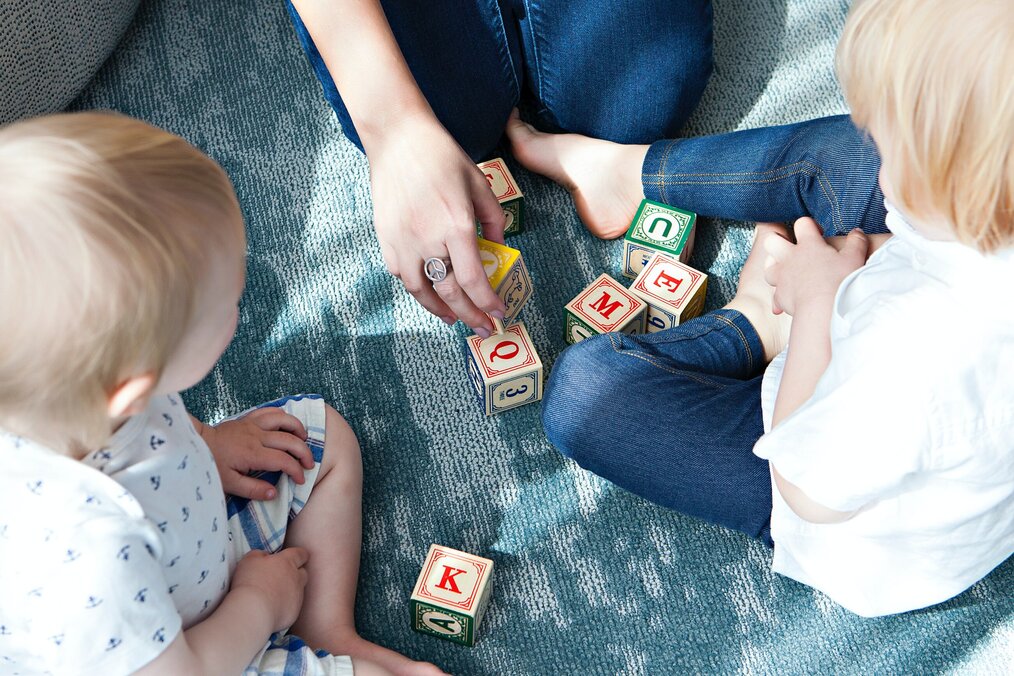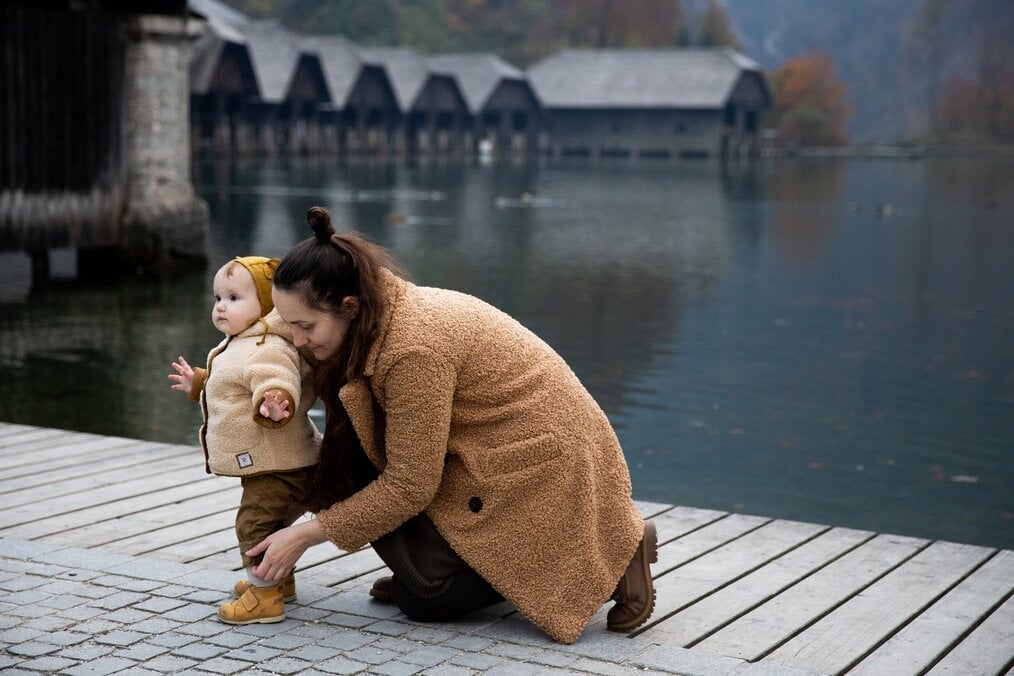
The Complete Guide to Au Pair Jobs in Europe
Working abroad as an au pair is a great way to see the world while earning a bit of cash. Check out this complete guide to learn about what it's like to au pair in Europe, how to find jobs, and the salary and benefits you can expect.

If you love children and have a desire to live and work abroad, becoming an au pair in Europe might just be your next big adventure.
Au pairs work as foreign nannies for children overseas, generally living with the family and helping with small tasks around the house. Au pairs are given pocket money and free time to enjoy the local area.
GO spoke with Dena S., a 24-year-old American working as an au pair in Germany to learn about her unique experience.
Why work as an au pair in Europe?
Tourists flock to Europe for its history, food, and sights to see. But why be a tourist when you can live there?
Here are some reasons for becoming an au pair in Europe:
- Au pairing in Europe presents a world of opportunities for language learning, travel, and cultural immersion.
- Monthly stipends in Europe tend to be generous with reasonable work schedules.
- Cheap travel across Europe means au pairs can explore neighboring countries during holidays and time off.
- Special au pair visas make working in Europe attainable and legal.
Let's take a closer look at the job itself to familarize yourself with typical au pair contract.
“I chose Germany because they have something called an au pair visa so it’s a really easy way for people to come to Germany as an au pair. I’ve also always been interested in living in Germany and visiting Germany and I wanted to use this as an opportunity to see more parts of the country and get to know the people better.”
Life of an au pair in Europe

Your au pair experience will be unique with no defined template of how your day will look. Despite the fact that no two jobs will be the same, there are common things you can expect with an au pair contract in Europe.
Read more: A Day in the Life of an Au Pair Abroad
Duties of au pairs in Europe
The duties and hours of an au pair in Europe will vary not only by country but also by family. Your average day may not even be very consistent from day to day or week to week. Some families may want your help during the morning and afternoon, while others may only need you in the evenings.
Regardless of where you are living as an au pair, your main duties should be related to childcare. This means not only looking after the children but also preparing meals for them or tidying their things.
Some families may require more housework, like laundry or doing the dishes, more intense cleaning, or meal preparation for the entire family. This is something that should be outlined in the interview process. Don’t be afraid to say no to a family if you feel the duties they expect are above and beyond what your contract should reasonably require.
Working hours for au pairs in Europe
Being an au pair is a part-time job and in most European countries, you’ll find au pairs working anywhere from 2-6 hours a day, five or six days a week. Countries with more official au pair programs may have a limit on the number of hours you can work.
During the interview process make sure you have a very clear idea of how much and when you will be working. Inquire about the daily schedule and don’t forget to ask if you will be required to work weekends.
Accommodation for au pairs in Europe
Au pairs generally live with the family. At the very least, you should have your own furnished room. Often you will also have your own bathroom, but you might have to share -- usually with the children.
If you’re living outside of a major city, you will probably have more space than if you are in a big city like Paris or Rome. The few really lucky au pairs, like Dena, have their own apartment completely separate from their family. Don’t hold out for this though, as it is rare.
Make sure you ask about the living arrangements during the interview. Hash out all rules and expectations related to living arrangements before you arrive so there are no surprises later.
Salary and benefits for au pairs in Europe
As an au pair in Europe, you'll receive a weekly or monthly stipend, often referred to as pocket money, as well as room and board. The amount of money and other benefits will vary by country and family. However, most countries have a minimum amount of pocket money that must be given to the au pair. Be sure you're familiar with what is legally required for your country before entering into talks with families.
When negotiating your stipend, don’t forget to ask about assistance paying for language school (if required), flights, and transport passes, and discuss the amount of time you get for vacation.
Once again, these benefits will vary greatly depending on both your family and what country you live in.
My family gives me 300 euros a month. If I’m traveling though, they will add more money to that. Some people live in the same home as the family they work for but I live in a separate apartment about a ten-minute walk away from the family. I get health insurance. I work 25-30 hours a week so that’s childcare, light cooking and cleaning, standard things like that."
Tops countries for au pairs in Europe

Europe is one of the most popular regions for au pairs due to the good working conditions, high stipends, and dedicated visas which make it easy to move abroad. We've highlighted some of the top countries to kick off your research. Pick one or do them all!
Country information provided by AuPairWorld
Au pair in Germany
- Age requirement: between 18 to 26 years old
- Minimum monthly stipend: 280 euros
- Working hours: no more than 6 hours per day, no more than 30 hours a week
Oktoberfest, castles, and currywurst await you in charming Germany. Au pair hopefuls can stay a minimum of six months up to a year. Non-EU applicants will need an au pair visa to come to Germany.
Au pairs who wish to study German during their time abroad will receive a 50 euro contribution per month from the family to help cover the cost of their classes. This is on top of the minimum amount of pocket money provided.
Au pair in France
- Age requirement: between 18 and 30 years old
- Minimum monthly stipend: 320 euros
- Working hours: no more than 25 hours a week
What sounds better than spending your day off reading a book at a cafe beneath the Eiffel Tower or strolling through a vineyard in Bordeaux? France draws au pairs from around the world and it's clear why.
If you aren't an EU citizen, you will need to apply for a long-stay visa at your local French embassy. Au pairs must stay for a minimum of 3 months, but if you're having a great time, you're allowed to stick around for up to two years!
Au pair in Spain
- Age requirement: between 18 and 26 years old
- Minimum monthly salary: 280 euros
- Working hours: no official regulations although 30 hours a week is recommended
Whether you long for the mountains of northern Spain or the sparkling beaches in the south, Spain is a land of contrast with something for everyone. Madrid and Barcelona are popular destinations but head outside of the city to find ancient villages with tons of corners to explore.
Visas for au pairs in Spain are a bit tricky. For jobs under 3 months (hello, summer!), au pairs from non-EU countries can generally enter the country visa-free. If you want to stay longer, you must be enrolled in a language course for a minimum of 20 hours a week in order to be eligible for a student visa. There is no minimum or maximum length of time to work as an au pair as long as you meet the entry requirements.
Au pair in Belgium
- Age requirement: between 18 and 25 years old
- Minimum monthly salary: 450 euros
- Working hours: no more than 4 hours a day, no more than 20 hours a week over 6 days
One of the cushiest gigs in Europe, Belgium has low working hours while providing a good stipend. Flemish-speaking in the north, French-speaking in the south, and German-speaking in the east, Belgium has a fascinating history where several cultures and languages collide.
Depending on the region where you end up working, you will need to enroll in a language course for either Dutch, French, or German. Au pairs are required to apply for a work permit in order to come work with a family in Belgium. Despite having a work permit, you're not allowed to get another paid job during your stay.
Au pair in Switzerland
- Age requirement: between 17 and 25 year olds
- Minimum monthly salary: between 500-700 CHF (526-736 USD)
- Working hours: no more than 30 hours a week
Switzerland is one of the most expensive countries in Europe but working as an au pair is your ticket to avoiding the major expenses of room and board. Au pairs in Switzerland receive a high stipend compared to other countries in Europe so you may be able to save a bit, even with weekend trips for fondue!
You will be required to attend a language course while working and the language you study will depend on the region you're living in. Italian, French, German, and Romansh are official languages so if you have a target language in mind, you may want to research where it's spoken and look for families in that region.
Au pairs from outside of the EU can stay for three months without a visa. If they wish to stay longer, they will need to apply for the appropriate visa, which may be a bit more complicated.
Au pair in Sweden
- Age requirement: between 18-30 years old
- Minimum monthly salary: 3,500 SEK (335 USD)
- Working hours: no more than 25 hours a week
Scandinavian countries have a reputation for happy citizens that live healthy and balanced lives. Sweden tops the list for quality of life and is a fabulous choice for aspiring au pairs.
All au pairs are required to take Swedish classes while in the country. Non-EU citizens will also need to apply for a work permit before heading off to their au pair gigs. You can stay for a maximum of 12 months as an au pair in Sweden.
Au pair in Denmark
- Age requirement: between 17 and 30 years old
- Minimum monthly salary: 4,550 DKK (621 USD)
- Working hours: no more than 3 to 5 hours a day, no more than 18 to 30 hours a week
Au pairs in Denmark enjoy a sizeable stipend and the possibility of working as little as 18 hours. Danish language classes and the return flight ticket home are covered by the family so the perks in Denmark keep coming. Demark has two visa options for au pairs from non-EU countries.
Considered one of the happiest nations on Earth, Denmark prides itself on a work-life balance that puts well-being first. A country with both ample natural beauty and modern cities, spend your days off walking on the beach or enjoying the architecture of Copenhagen.
How to get a job as an au pair in Europe

Moving abroad to work as an au pair isn't as complicated as it may seem at first. Finding the perfect family takes a little time and persistence but it's worth the effort and there are plenty of resources to help you along the way. Follow these simple steps to start your new life as an au pair in Europe.
Search for families
Finding the perfect family for your au pair in Europe adventure is one of the most important parts so don't rush this step! Whether you look for a family on your own or use a program provider or agency, make sure to thoroughly do your research to find the best fit.
Find an au pair job independently
To find a family yourself, you'll need to set up a profile on an au pair website. Great Au Pair and AuPairWorld are the most common and both are free for au pairs. Remember to complete your profile in full and emphasize any sort of childcare experience you have.
Include a few clear photos of you smiling, and if you have any with children, use those. You want to present a friendly and warm image of yourself to potential families.
If you choose to find a job independently, you'll be responsible for negotiating a contract and applying for your visa. If your chosen family has had an au pair before, they will be able to help you with the process.
I used a website called AuPairWorld.com. I would describe it as kind of like a dating app but for au pairs. They match you based on the qualities that families want and the qualities that the au pairs want.
Use an agency to find an au pair job
Agencies may charge a fee for au pairs and families to participate, though this isn't always the case. They will guide you through the process of finding a family and usually help negotiate contracts and sort out visa requirements.
The downside, though, is that your search is limited to families who have also signed up with this agency and your candidate pool may be significantly smaller.
If you're interested in signing up with an agency, Go Overseas has a list of au pair program providers and agencies (along with reviews from past au pairs) to help you find the right one for you.
Choose a family
Choosing the right family is key to a fun and successful year abroad. Rather than taking the first offer you receive, take your time to make sure all your boxes are checked. It's good to be picky during this stage!
The first thing you need to do is make a list of the things you absolutely want out of your au pair experience. These could be things like location, age of the children, time off, or salary.
Once you’ve decided on your top priorities, begin your search. If you’re with an agency this will involve telling them your preferences, and if you’re doing this alone you can use these terms to filter families on the website.
Start by contacting any families that catch your eye and meet your requirements. Don’t be afraid to ask any questions you might have about life with them. This is a time to weed out the ones who aren’t a good fit.
Read more: How to Find the Perfect Host Family as an Au Pair
When you’ve narrowed it down, schedule a video chat with the parents and kids. While there’s no surefire way to guarantee a good match from thousands of miles away, talking face-to-face can help determine if you click.
If you really like a family, don’t be afraid to tell them you want to be their au pair. They probably feel the same way and will appreciate your sincere interest.
Conversely, if it doesn’t feel like a fit, definitely don’t string them along or feel pressured to say yes. Don’t put yourself, or this family, in a situation that will make for a less than ideal year.
Secure a visa
Thanks to the popularity of au pairing in Europe, most countries have visa schemes in place. This makes moving abroad to work as an au pair so much easier.
For jobs that are 3 months or less
If you hold a passport from a non-EU country and want to stay in Europe for less than 90 days, you will not need to apply for a visa. This is ideal for summer or short-term au pairing.
Hooray! You're one step closer to moving abroad!
For jobs that are more than 3 months
Prospective au pairs from non-EU countries will need to for a visa. Depending on the country, this will be one of the following:
- Au pair visa: Austria, Germany, Finland, Denmark
- Student visa: Spain, Italy
- Work permit/visa: Sweden, Belgium, Norway
- Residence permit: France, Luxembourg, Switzerland, the Netherlands
You will need a valid passport to apply for a residence permit or visa.
Make sure you understand all the requirements for the country you wish to au pair in. Some countries require elementary language proficiency prior to applying for a permit or visa and some require that you register for language classes while you are working as an au pair. Depending on your destination, it may not be mandatory for families to pay for your studies so confirm that you can afford the potential fees.
Read more: Easy Visas, High Pay: The Best Countries to Au Pair Abroad
Become an au pair in Europe

Becoming an au pair in Europe is a fantastic way to live abroad while gaining skills and earning a bit of cash. Careful planning and research will help you land your dream role with a family somewhere awesome.
When asked what piece of advice she would give to anyone considering au pairing in Europe, Dena had this to say:
"Go with the flow. Don’t come with any expectations of how things should be. This is an opportunity for you to go out of your comfort zone to experience a new culture, new family, new job. [This mentality] has helped me form more of a connection with the family I’m working for. Be open-minded!"
Choose au pairing in Europe and get ready for an immersive cultural learning experience!
Dig in to your au pair research:























